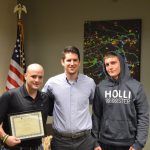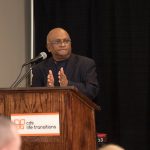Area’s First Day for Special Smiles Event Helps Bridge the Gap to Care for People with Intellectual Disabilities
Eastman Institute for Oral Health, Golisano Foundation and Special Olympics are partnering to bridge a long-standing gap to improve access and oral health care for people with intellectual disabilities (ID) and hosted A Day for Special Smiles, a first-of-its kind event in the area.
Access to dental care is the most unmet health care need in children and adults with developmental disabilities, and for many years, Special Olympic athletes have had oral health screenings, and determined that one in four athletes has untreated dental decay that can cause pain and other medical problems. Despite referrals for care, most of these athletes are not getting the care they need for a variety of reasons uncovered by a recent Golisano Foundation/Eastman Dental-sponsored Task Force.
“People with disabilities face many barriers to accessing high-quality health care, including difficulties in finding health providers who are trained and willing to treat people with disabilities and who will accept their insurance,” said Ann Costello, director of the Golisano Foundation.
But thanks to a new Special Olympics initiative dedicated to providing comprehensive, community-based health care and resources for people with ID, and to educating healthcare professionals, A Day for Special Smiles is the first step in closing this gap. The initiative, Special Olympics Healthy Communities is funded by a $12 million donation from Tom Golisano.
“By supporting Healthy Communities, we hope to eliminate some of the barriers, and connect people with care in their community to address problems that are preventable and treatable and can help them live a fuller and more productive life,” said Onolee Stephan, director, Community Health Program for Special Olympics in Rochester.
Athletes received treatment for their most immediate dental needs including baseline x-rays, full exams, fillings, and cleanings. More than 30 volunteers, including dentists, dental students, dental assistants, faculty, and staff provided the care at Eastman Dental Downtown, who donated the clinic space and time.
“Part of our mission is to care for the underserved, including people with intellectual disabilities, complex diseases, and geriatric patients, among others,” said Dr. Eli Eliav, director, Eastman Institute for Oral Health. “We’re committed to sharing our expertise in this area with the world and are establishing fellowship and training programs to expand this vital educational initiative.”
“I really enjoyed this experience today,” said Bharathi Gorantla, DDS, a first-year resident in the EIOH Advanced Education in General Dentistry program, who had previously not had any interactions with adults with ID. “I learned that taking a little extra time is beneficial in treating the patient, to allow for successful communication and comfort level for the patient.”
“We are faced with so many issues in this field toward dental care, that today’s event was a phenomenal way for people to get adequate care, especially in between their six month visits,” said Tim Rifenberg, a residential manager at CDS Monarch, and who brought 13 people for treatment. “These folks have more dental issues and more challenges, and in my opinion, require more care than every six months. A big challenge is the lack of providers who accept Medicaid and are familiar or patient with the ID disability population.”
Another challenge, Rifenberg added, is staffing issues. Having a staff member accompany the patients to the dentist or to A Day for Special Smiles event is critical for a successful visit, he said. “Ideally, having a portable unit travel to the group homes would be an incredible service,” said Rifenberg, who has worked with people with ID for 25 years.
“I want to come here for good,” said Mike Traver, a Special Olympics athlete who lives in a CDS Monarch residence. “I like it here…I like the treatment, and was treated nicely.”



